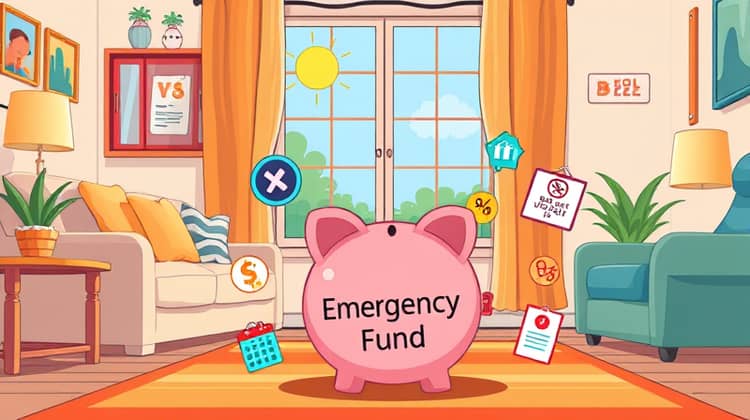Emergency Fund Insights: Homeownership vs. Renting – What You Need to Know

In today's financial landscape, the importance of having an emergency fund cannot be overstated. This financial safety net is crucial for individuals looking to navigate the uncertainties of life, especially when it comes to major financial commitments such as homeownership and renting.
Balancing the need for an emergency fund with the responsibilities of homeownership or the flexibility of renting can be challenging. By understanding how each scenario impacts your financial preparedness, you can make better decisions that align with your goals and lifestyle.
This article will explore the nuances of maintaining an emergency fund in the context of homeownership and renting, highlighting essential considerations and strategies for securing your financial future.
Understanding the Emergency Fund

An emergency fund is a savings account specifically designated for unexpected financial emergencies. This fund acts as a financial buffer to cover expenses such as medical bills, car repairs, or sudden job loss, ensuring you are not caught off guard by unforeseen costs.
Financial experts generally recommend setting aside three to six months' worth of living expenses in your emergency fund. However, the ideal amount can vary based on personal circumstances, job stability, and whether you own a home or rent. Understanding these dynamics is crucial to determining your savings strategy.
Having a robust emergency fund is particularly important for homeowners because unexpected repairs can arise at any time, and relying solely on credit cards could lead to substantial debt. In contrast, renters may face different priorities and financial strategies, making it essential to evaluate which scenario works best for you.
Homeownership and the Emergency Fund

Homeownership brings many joys, but it also comes with financial responsibilities that can put a strain on your emergency fund. It's essential to understand the various costs associated with owning a home and how they impact your financial preparedness.
Owning a home means you're responsible for all repairs and maintenance. Unlike renting, where landlords may cover these expenses, homeowners need to have additional funds set aside to troubleshoot and repair issues as they arise.
1. Higher Initial Costs
One of the first financial hurdles of homeownership is the upfront costs. From down payments to closing costs, these expenses can deplete your savings considerably. It's crucial for prospective homeowners to factor in these initial outlays when creating their investment budget.
- Down payment (usually 5%-20% of the home price)
- Closing costs (typically 2%-5% of the loan amount)
- Moving expenses
- Home inspection fees
These initial costs can significantly impact your emergency fund, reducing the cushion you have for unplanned expenses. Thus, potential homeowners should ensure they maintain a separate emergency fund even after purchasing a property to be prepared for financial setbacks that could occur as a result of homeownership.
Debt levels may increase, making it challenging to save further, so detailed budgeting and planning are vital to ensure ongoing financial stability.
2. Maintenance and Repairs
A significant advantage of renting is that landlords typically handle maintenance and repairs, relieving tenants of these financial responsibilities. Homeowners, on the other hand, should prepare themselves for ongoing costs related to maintaining their property.
From leaky roofs to appliance breakdowns, the costs associated with repairs can put a large dent in your savings. Therefore, having a solid emergency fund is not just a good idea; it becomes a necessity for homeowners.
- Unexpected plumbing issues
- Roof repairs
- Appliance replacements
- Landscaping costs
Neglecting to budget for these expenses can lead to financial strain, especially if you are unprepared for an urgent situation. Establishing a proactive maintenance fund in addition to your emergency fund can also be beneficial, as it allows for manageable upkeep without disrupting your savings plans.
By setting aside specific amounts regularly, homeowners can ensure their emergency fund is not entirely consumed by maintenance costs.
3. Property Taxes and Insurance
Homeownership entails the responsibility of paying property taxes and securing homeowners' insurance. These ongoing expenses can add to the financial weight that homeowners must bear.
Those purchasing a home should be aware that property taxes can fluctuate yearly based on local government assessments, and homeowners' insurance costs can vary widely due to different coverage levels and local risk factors.
4. Market Fluctuations
Real estate markets can be unpredictable. Fluctuations in property value can render a home worth less than what was initially paid, which could create challenges for homeowners when selling their property or applying for refinancing.
Additionally, selling a home during a downturn can lead to financial loss, making it essential for homeowners to have adequate emergency funds to navigate these market challenges without resorting to unfavorable financial decisions.
- Potential loss of home equity
- Increased difficulties in selling or refinancing
- Lack of financial freedom during downturns
Being prepared for such market changes can mean the difference between financial stability and significant hardship. A well-fortified emergency fund can provide homeowners essential security in turbulent markets, ensuring they smoothly weather any economic storm.
Renting and the Emergency Fund

Renting can present both opportunities and challenges regarding financial preparedness. Since responsibilities for maintenance often lie with the landlord, renters may find that they can allocate more funds towards their emergency savings compared to homeowners.
However, it's still crucial for renters to build a solid emergency fund, as life can be unpredictable, and sudden expenses can arise just as they do for homeowners.
1. Lower Initial Costs
Renting typically involves lower initial financial obligations when compared to buying a home. Renters usually only pay the first month's rent and a security deposit, making it easier to conserve additional funds for their emergency savings.
This lower barrier to entry allows renters to focus on establishing their emergency fund and maintaining it, ensuring they are ready for life's uncertainties.
- First month's rent
- Security deposit
- Potential application fees
With fewer upfront costs, renters can allocate more of their disposable income toward their emergency funding. This flexible financial approach can be beneficial in building a financial safety net necessary for unexpected situations.
2. Predictable Expenses
Renters benefit from predictable monthly expenses. Rent payments, utility costs, and maintenance responsibilities are often well defined, making budgeting easier and allowing renters to plan their savings strategy more effectively.
Since tenants do not have to worry about unanticipated large repairs or maintenance costs, they can maintain a steady growth of their emergency fund without drastic disruptions to their budget.
- Fixed rent payment
- Utility costs are typically predictable
- Less fluctuation from maintenance costs
Thus, renters can make more controlled financial decisions and continuously enhance their emergency fund without the financial rollercoaster that can sometimes accompany homeownership.
3. Flexibility
Renting allows for greater flexibility, which can be beneficial in times of economic uncertainty. Renters can easily adjust their living arrangements and make swift decisions based on market conditions and job opportunities.
Additionally, if financial responsibilities increase unexpectedly, renters can negotiate their terms with landlords or explore more affordable options without facing the long-term commitments of homeownership.
How Much Should You Save?

The amount you should save for your emergency fund largely depends on your lifestyle, income, and overall financial obligations. For homeowners, the recommendation often leans toward saving six to twelve months of living expenses to navigate potential shocks.
In contrast, some experts suggest that renters can maintain a lower threshold, perhaps three to six months of essential living costs, due to fewer responsibilities in areas of maintenance and repairs.
- Assess your monthly living expenses
- Determine potential fluctuations in income
- Adjust savings goals based on homeownership or renting responsibilities
Ultimately, regularly evaluating your emergency fund goals and adjusting them based on your life circumstances will lead to better financial security, whether you own a home or are renting.
Conclusion

Both homeownership and renting come with unique financial implications that shape your emergency fund strategy. It's critical to understand the differences in responsibilities, expenses, and risks associated with each housing option. By weighing these factors, you can make informed decisions to bolster your financial safety net.
Establishing and maintaining an adequate emergency fund should be a priority for both homeowners and renters. Regardless of your living situation, being prepared can create peace of mind and allow you to navigate life's uncertainties with confidence.






